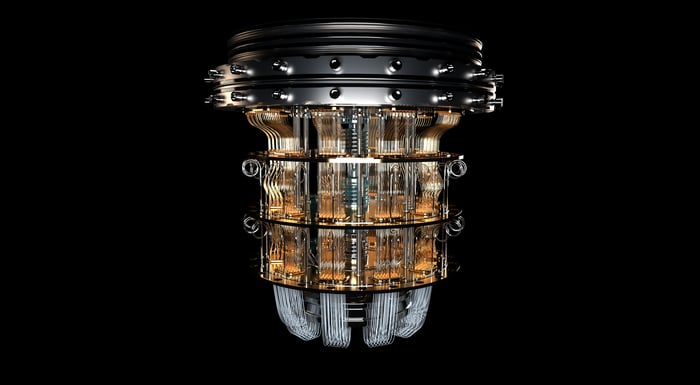4 Quantum Computing Stocks That Could Help Make You a Fortune

Key Points
Quantum computing startups have massive upside.
Several legacy tech players are pursuing AI and quantum computing simultaneously.
Quantum computing is a major emerging technology that could be commercially viable by 2030. With that timeframe not all that far away, investors are starting to take quantum computing stocks more seriously. Several stocks in this industry have the potential to make investors a fortune if they can grow from startups to dominant tech companies, but there's no guarantee they can achieve that. Several established players are pursuing quantum computing. While these don't have nearly the upside as their smaller counterparts, they are much safer bets.
I believe taking a balanced approach to the quantum computing arms race is a smart investment move, and these four stocks represent a great way to capitalize on this massive trend while also leveraging current market conditions.
Where to invest $1,000 right now? Our analyst team just revealed what they believe are the 10 best stocks to buy right now. Continue »

Image source: Getty Images.
The startups: IonQ and D-Wave Quantum
Investing in quantum computing startups is an attractive option. Often, these companies are worth about $10 billion or less, but could grow to become far greater if their technology stack becomes the go-to option in the quantum computing realm, much like Nvidia's (NASDAQ: NVDA) GPUs have in the artificial intelligence (AI) realm. However, it's possible that their technology doesn't work out, and the stocks go to $0. This is likely to happen to many competitors in the quantum computing race, as several techniques are likely to yield unsatisfactory results compared to other technologies.
Two of my favorite pure-play quantum computing companies are IonQ (NYSE: IONQ) and D-Wave Quantum (NYSE: QBTS). Both companies are taking two separate approaches to quantum computing, which helps spread out risk.
IonQ employs a trapped-ion approach, which represents the most accurate quantum computing technology currently available and can also be implemented at room temperature, making it significantly more cost-effective. However, this comes at the cost of processing speed, which is slower compared to other options.
D-Wave Quantum utilizes quantum annealing, making it particularly well-suited for optimization problems, such as mapping logistics networks. Quantum annealing has a more limited use case than general-purpose quantum computers, such as those developed by IonQ. Still, it could be a viable technology that yields real results in areas that can benefit from quantum computing.
Success isn't guaranteed with either of these investments, which is why balancing their risk with surefire bets is a smart idea.
Big tech players: Alphabet and Nvidia
It would be a mistake for investors to move on too quickly from the AI investing trend. There are still truckloads of money being spent on AI computing capabilities, and that isn't slated to slow down anytime soon. This benefits Nvidia more than any other company, but Nvidia is also getting involved in the quantum computing industry.
While Nvidia isn't developing its own quantum processing unit, it is developing the technology that enables quantum computers to be integrated into traditional computing systems, such as those it manufactures. This hybrid computing approach is likely to become the primary use case of quantum computing. With Nvidia bridging the gap, it is poised to capitalize on this industry while also excelling in AI.
Another big player in the quantum computing space is Alphabet (NASDAQ: GOOG) (NASDAQ: GOOGL). Alphabet kicked off a major quantum computing investment rush in December 2024 when it announced that its Willow quantum computing chip completed a calculation that would have taken a traditional computer 10 septillion years (10 to the 25th power) to complete. This was a major breakthrough for Alphabet, but it's still a long way away from developing a commercially viable quantum computing system.
However, if it can be the first cloud computing provider to offer a viable quantum computing system, it stands to make a ton of money from various quantum computing workloads that will appear over the next decade.
In the meantime, Alphabet has a dominant base business and is starting to emerge as the leading AI company. This combination will make Alphabet a fantastic investment over the next few years.
This combination of four quantum computing investments is a great way to capitalize on the trend. It allows investors to balance the risk of pure-play quantum computing investments that may not survive with established big tech players that are benefiting from current market trends and also have quantum computing investments.
Should you invest $1,000 in IonQ right now?
Before you buy stock in IonQ, consider this:
The Motley Fool Stock Advisor analyst team just identified what they believe are the 10 best stocks for investors to buy now… and IonQ wasn’t one of them. The 10 stocks that made the cut could produce monster returns in the coming years.
Consider when Netflix made this list on December 17, 2004... if you invested $1,000 at the time of our recommendation, you’d have $640,916!* Or when Nvidia made this list on April 15, 2005... if you invested $1,000 at the time of our recommendation, you’d have $1,090,012!*
Now, it’s worth noting Stock Advisor’s total average return is 1,052% — a market-crushing outperformance compared to 188% for the S&P 500. Don’t miss out on the latest top 10 list, available when you join Stock Advisor.
*Stock Advisor returns as of September 8, 2025
Keithen Drury has positions in Alphabet and Nvidia. The Motley Fool has positions in and recommends Alphabet and Nvidia. The Motley Fool has a disclosure policy.







